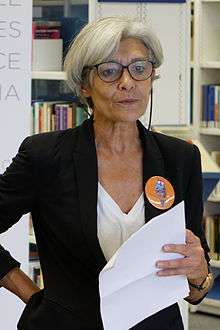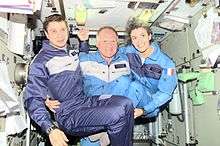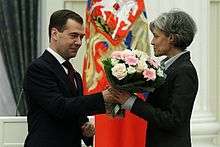Claudie Haigneré
| Claudie Haigneré | |
|---|---|
 | |
| CNES/ESA astronaut | |
| Nationality | French |
| Status | Retired |
| Born |
13 May 1957 Le Creusot, France |
Other occupation | Independent CEO at France Telecom |
Time in space | 25d 14h 22min |
| Selection |
1985 CNES Group 2 1999 ESA Group |
| Missions |
Soyuz TM-24, Mir-Cassiopée, TM-23, Soyuz TM-33, ISS-Andromède, TM-32 |
Mission insignia |
|
| Awards |
|
Claudie (André-Deshays) Haigneré (born 13 May 1957) is a French doctor, politician, and former astronaut with the Centre National d'Études Spatiales (1985–1999) and the European Space Agency (1999–2002).[1]
Background and training
Born in Le Creusot, France, Haigneré studied medicine at the Faculté de Médecine (Paris-Cochin) and Faculté des Sciences (Paris-VII). She went on to obtain certificates in biology and sports medicine (1981), aviation and space medicine (1982), and rheumatology (1984). In 1986 she received a diploma in the biomechanics and physiology of movement. She completed her PhD thesis in neuroscience in 1992.[1] Married to Jean-Pierre Haigneré, also a former astronaut.[1]
Space career

Haigneré was a back-up crew member for the 1993 Mir Altaïr mission in which her future husband Jean-Pierre Haigneré participated. The asteroid 135268 Haigneré is named in their combined honour. Haigneré visited the Mir space station for 16 days in 1996, as part of the Russian-French Cassiopée mission. In 2001, Haigneré became the first European woman to visit the International Space Station, as part of the ''Andromède'' mission. She retired from ESA on 18 June 2002.[2][3][4]
Political career
Following her career as an astronaut, Haigneré entered French politics in Jean-Pierre Raffarin's government. She was minister delegate for Research and New Technologies from 2002 to 2004 and succeeded Noëlle Lenoir as minister delegate for European Affairs from 2004 to 2005.[5]
Suicide Attempt
Haigneré attempted suicide in 2008. She has since stated that her actions were due to burnout syndrome[source?].
Director of Universcience
Haigneré was named as the founding director of Universcience in 2009.[6] At that time, she was an advisor to the Director of the ESA.[7] In 2015 Haigneré was criticised for her salary of 21,000 euros per month, more than the President of France, as well as for not paying taxes in France, and maintaining positions on the boards of France Telecom, Sanofi, Lacoste and L'Oréal.[8]
Honours

Haigneré is a commander of the Légion d’honneur.[5]
Sources
- Flitner, Bettina: Frauen mit Visionen – 48 Europäerinnen (Women with visions – 48 Europeans). With texts by Alice Schwarzer. Munich: Knesebeck, 2004. ISBN 3-89660-211-X, 108–111 p.
References
- 1 2 3 esa. "Claudie Haigneré (formerly Claudie André-Deshays)". esa.int.
- ↑ "cnes - Le site du Centre national d'études spatiales". www.cnes.fr.
- ↑ Becker, Joachim. "Cosmonaut Biography: Claudie Haigneré". www.spacefacts.de.
- ↑ "BBC - Space - Error". bbc.co.uk.
- 1 2 "Biography of Claudie Haigneré". UNESCO. Retrieved 6 November 2011.
- ↑ Foucart, Stéphane (25 March 2009). "Claudie Haigneré coiffe la Cité des sciences et le Palais de la découverte". Le Monde (in French). Retrieved 23 February 2017.
- ↑ "Une mission de culture scientifique et technique pour Claudie Haigneré". European Space Agency (in French). 26 March 2009. Retrieved 23 February 2017.
- ↑ "Le jackpot de l'ex-spationaute Claudie Haigneré : le ministère du Budget lui verse un salaire supérieur à celui du président de la République". politique.net (in French). 17 February 2015. Retrieved 23 February 2017.
